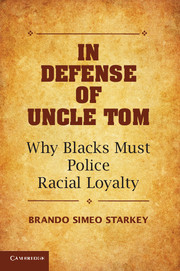Book contents
- Frontmatter
- Dedication
- Contents
- Acknowledgments
- Introduction
- 1 Solidarity, Social Norms, and Uncle Tom
- 2 Uncle Tom: 1865–1959
- 3 The Unwitting Pioneers
- 4 Uncle Tom: 1960–1975
- 5 No Man Was Safe
- 6 Uncle Tom Today: 1976–Present
- 7 So What About Clarence?
- 8 The Curious Case of Uncle Tom
- 9 What Now, Uncle Tom?
- Final Address
- Index
- References
1 - Solidarity, Social Norms, and Uncle Tom
Published online by Cambridge University Press: 05 May 2015
- Frontmatter
- Dedication
- Contents
- Acknowledgments
- Introduction
- 1 Solidarity, Social Norms, and Uncle Tom
- 2 Uncle Tom: 1865–1959
- 3 The Unwitting Pioneers
- 4 Uncle Tom: 1960–1975
- 5 No Man Was Safe
- 6 Uncle Tom Today: 1976–Present
- 7 So What About Clarence?
- 8 The Curious Case of Uncle Tom
- 9 What Now, Uncle Tom?
- Final Address
- Index
- References
Summary
Introducing Uncle Tom
In 1934, Fisk University, a black college in Nashville, disciplined one of its students for protesting the school’s decision to have student singers perform at a segregated theater. A columnist for the Baltimore Afro-American, a black newspaper, commended the student and criticized Fisk for bowing and scraping before Jim Crow. The columnist preferred to burn down all Southern black colleges rather than have the race’s brightest young minds learn in “‘Uncle Tom’ Schools,” which train their students to lie down while educators drain their valor to resist racism.
A few months later and nearly 700 miles north, M. Gran Lucas, a black elementary school principal, defended segregation before a National Education Association gathering in Washington, DC. Lucas told the audience, which included President Franklin Roosevelt, that separate schools were best for black children. According to Lucas, black pupils had particular needs that integrated schools could not accommodate. Columnist L. K. McMillan lambasted the speech as one in a series of disgraceful pro–Jim Crow speeches blacks had delivered to national audiences in recent memory. Lucas, like the other speakers, was an “Uncle Tom” more concerned with receiving his “assured pork chops” than black children.
These incredibly rich tales reveal various textures that represent just a piece of the intricate tapestry that is the black American existence. These accounts illustrate the burgeoning race consciousness and black solidarity before the civil rights movement; they highlight the frequent expectations of racial loyalty; they reveal how the black community managed social norms; and they suggest the sanctioning power of Uncle Tom. Each of these separate ingredients, when stewed together, forms the basis of this book.
- Type
- Chapter
- Information
- In Defense of Uncle TomWhy Blacks Must Police Racial Loyalty, pp. 9 - 41Publisher: Cambridge University PressPrint publication year: 2015



